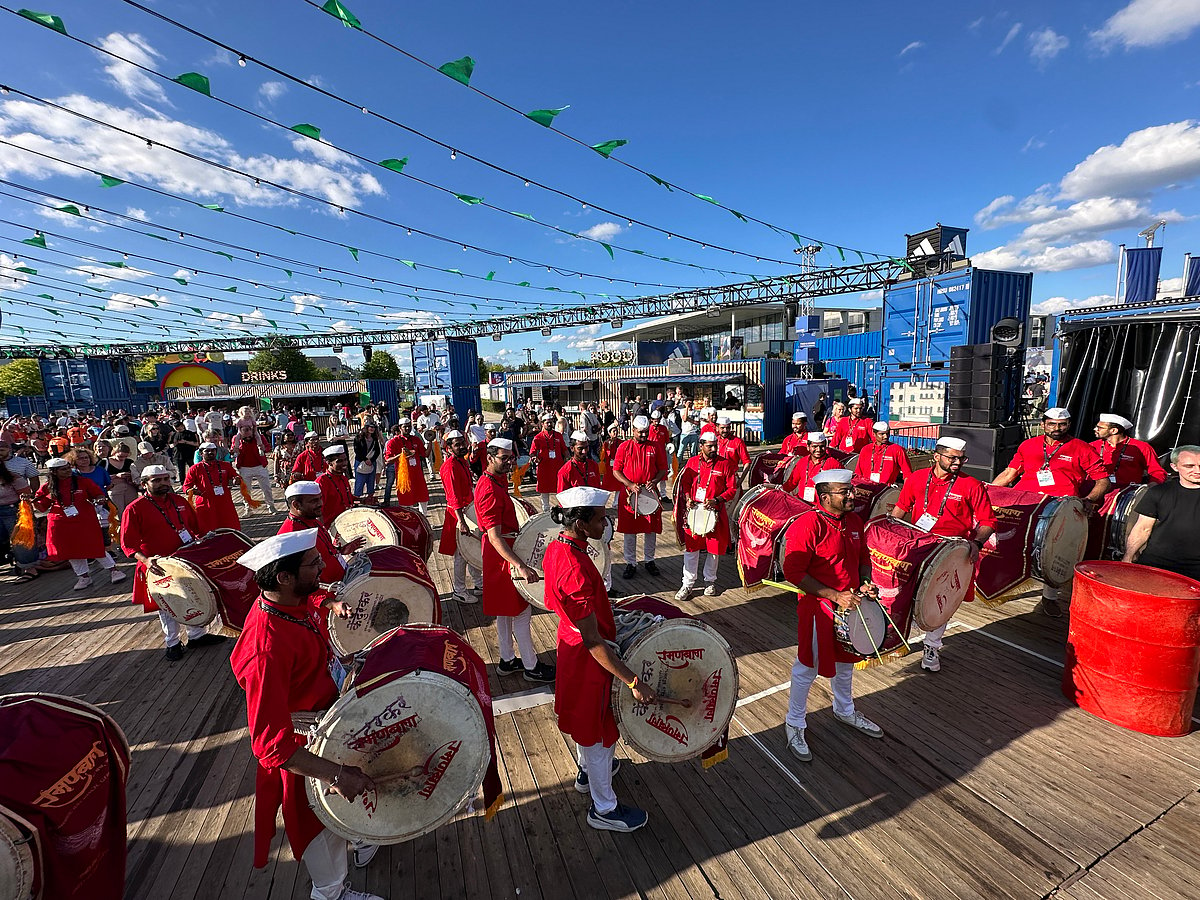The resonating sound of the drum carries over the open park, beckoning everyone getting off the ‘tram’ to join into the beat bringing everyone, Indian and foreigners alike to the Halasovo Náměstí in Brno, Czech Republic.
That is the magic of Indian Dhol Tasha, performed by the youth of Ramanbaug Yuva Manch at Vibrant India event, that takes place very year to promote Indian culture, heritage, traditional arts, and diverse customs.
The "Vibrant India" event in Brno, Czech Republic, presented by the Brno Dhol Tasha group, is a cultural celebration that highlights India's rich traditions while fostering integration with the local community. “Since its inception in 2022, the event has collaborated with Ramanbaug Yuva Manch from Germany. It has been a major attraction for both, the Indian expats in Czech Republic and the residents of Brno, says Ajinkya Sanjay Dhamdhere, a resident of Brno. This year's celebration expanded significantly, thanks to the support of local governing bodies and the Indian expats. This year, the troupe of young men and women led by Anand Deshpande, a group member of Ramanbagh Yuva Manc, had not just the Indian swaying to their beats but even the many Czech and other foreigners.

Ramanbaug is not a new name for many Punekars and Indians as it is a known Dhol Tasha group for last more than 40 years. The group’s members have started a branch in Germany since 2019 and slowly inching in popularising these unique drums in Europe. The group plays set of rhythms that you usually hear in remote Indian villages during village festivities. They attempt to replicate them in Europe. With more than 100 members spread across Germany, Netherlands and Belgium, they have devised an offline/ online practice strategy. They meet every alternate weekend to practice in locations in Berlin, Hanover, Mainz, Stuttgart and Munich and Dusseldorf.
“We started this percussion ensemble firstly as we were missing our home especially during Ganesh Utsav, being away from home it was difficult. While playing on the streets of Germany, piqued the curiosity of many. Last three years we have collborated with Carnival de Culturum in Berlin. We are proud to have won first prize in the music group, thus making these Dhol Tasha also part of the European listening circle,” Anand says.
“When you practice in Pune, for straight two months every evening you meet and do it. So, with this constraint we had to come up with innovative ways of training the rhythm. We devised a lot of exercises, mental exercises, online sessions to compliment and we have decentralized sessions, like whoever, whichever city is close to them, they go there and practice every alternate weekend. Some of the weekends we either meet in Berlin or in the south, in Munich or in Stuttgart. So locally the entire group comes together but that's not so often. Hence, we have found a lot of innovative ways of practicing and teaching rhythms. We don't have a constraint that you need to have an experience or etc,” explains Anand.
Procuring these instruments was one of the major difficulties. In 2019 when they came as students to Germany, they put in most of the available resources and procured the metal barrels in Europe.
“We found one vendor in Netherlands and worked for around six to seven months to work out on the certain dimensions. Since we have been playing and building the drums for many years, we know how to prepare and assemble it. So, all the small components, were sent by our group in Pune by courier. Though it was very expensive, every member contributed to make it possible,” Anand elaborates.
He feels that Dhol Tasha is an important part of his life in Pune. “I grew up in the old part of Pune, from my window to the right I see Shaniwar Wada, to the left I see Dagadu Sheth Halwai Ganpati. Dhol Tasha rhythms, you can say are part of my life and it's in my blood.” Playing on the streets of Germany he resonated with the feeling of playing in Pune; especially the connection with audience. “Rhythm has no boundaries. It must be felt. Music can bring people, connect people together.”
Another member Rushi Kishkendre, 30-year-old who lives in Munich had heard Ramanbaug played while he was a student in Aachen. It was during the celebration of Ganapati festival in the small Marathi community. It was there that the idea to perform Dhol Tasha was conceived. To have this kind of group in Germany was not imaginable in 2018. The group began with five members initially and now have a large group of players.
“It was a surreal feeling because I never believed that it could be done. But I saw so many Indian people and local people joining those events that it was quite nice feeling. And this kept happening city after city, year after year… every year we started adding new cities,” he said.

Rushi says playing dhol has a meditating effect. “Sometimes you are so occupied with so many personal feelings, personal stress or thoughts… but practicing somehow like a meditation for me, it could be different for my other teammates, but in that moment, I am truly committed to the rhythm separately.”
Aditya Satam, a comparatively new member hails from Thane studies in Berlin. When he saw their performance during the 2022 Ganesh festival celebrations he was enthused. “Ramanbaug has its different variations. Every alternate week, we have trainings, practice sessions all over Germany. When I joined there were people who put in personal attention so that I knew every new variation that was formed. They made it easier. Last year I played in five locations. It was my first year in Germany and I was traveling to different parts. It was an amazing experience. I can't now stop playing for sure, that's for sure,” says Aditya.

Maharashtra Mandal, Czech Republic gears up to welcome Ganapati on 14 September in Prague. Pravin Kanase, Satara, President Maharashtra Mandal, Czech Republic says, “We have 150 Maharashtrian members in Prague and in Czech Republic around 200 members in Brno, Ostrava. The motto is to celebrate the Ganesh festival pan Czech Republic, even Czech join in the celebration besides Indians. Total we have 10,000 Indians spread across Czech Republic.”
Maharastrian culture is the core part of the mandal. Focus of the mandal is on connecting the new generation with their mother tongue and culture.











